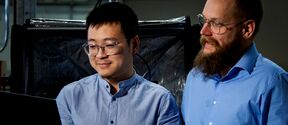The space journey of Aalto-2 satellite is coming to an end - its trip finishes tomorrow night when it becomes a shooting star in the sky

Built at Aalto University, the Aalto-2 was the first Finnish-built satellite to be launched into space and now its journey is coming to an end.
The Aalto-2 satellite was launched into space in April 2017 and in May of the same year started its journey from the International Space Station. The satellite is expected to hit the Earth's atmosphere between Wednesday and Thursday, at approximately 00.51 Finnish time.
All satellites in low orbit will gradually fall towards Earth. The lower the satellite gets, the faster it will fall.
“When the track height is less than 200 kilometres, it will take about 24 hours for a satellite to enter the atmosphere. For Aalto-2, this milestone was reached on Tuesday evening,” says Professor Jaan Praks.
Weighing just about two kilograms, the Aalto-2 is so small that it will be completely destroyed when it plunges into the atmosphere at high speed. Heat from a pressure wave burns up the satellite, and its destruction appears in the sky as a shooting star.
Eradicating space debris
Although Aalto-2 did not fully function as expected in space, and the connection to the satellite was lost soon after its release from the International Space Station, according to Praks, the project taught the Aalto satellite team a lot.
Meanwhile, Aalto-1, which started its space journey on midsummer eve 2017, has worked according to plan and science data has been received from all of its research equipment. Currently, the satellite team at Aalto University is preparing to use an electric solar wind sail or a ‘plasma brake’, developed by the Finnish Meteorological Institute. The brake consists a long, thin and conducting tether which is released from an on-board reel.
When an electric potential is connected to the tether, it interacts with charged particles in space plasma. This reduces the speed of the satellite, making it fall into the atmosphere faster. If everything works as planned, the fall of Aalto-1 will take a few months rather than a couple of years without the brake.
“The aim is to reduce space debris by bringing satellites that have already completed their mission out of orbit in a quick and controlled way. In the present space boom cleaning the orbits is becoming increasingly important. In the future, every satellite will most likely need a braking device,” says Jaan Praks.
The reduction of space debris is also a key part of the work of the Centre of Excellence in Research of Sustainable Space. The Centre of Excellence consortium consists of the University of Helsinki, Aalto University, the University of Turku, and the Finnish Meteorological Institute. The Centre of Excellence’s first FORESAIL-1 satellite, which is already under construction in Aalto, will have a next version of plasma brake system used in Aalto-1.
Further information:
Professor Jaan Praks
Aalto University
Tel. +358 50 420 5847
jaan.praks@aalto.fi
Research Director Pekka Janhunen
The Finnish Meteorological Institute
Tel. +358 29 539 4635
pekka.janhunen@fmi.fi
Read more news

Seizing opportunities
Vuong Vo's path led through Aalto University and VTT to a startup, where he is helping build the protein factory of the future.Growing Materials, Growing Ideas: Inside the BioMaker Studio
At Aalto University’s BioMaker Studio, initiated by Ena Naito, students and researchers experiment with living materials, from algae to mycelium, creating an open, interdisciplinary space where design, biology, and collaboration grow together.
Your voice gives away valuable personal information, so how do you keep that data safe?
With speech technologies becoming increasingly common, researchers want to make sure we don’t give away more information than we mean to.






